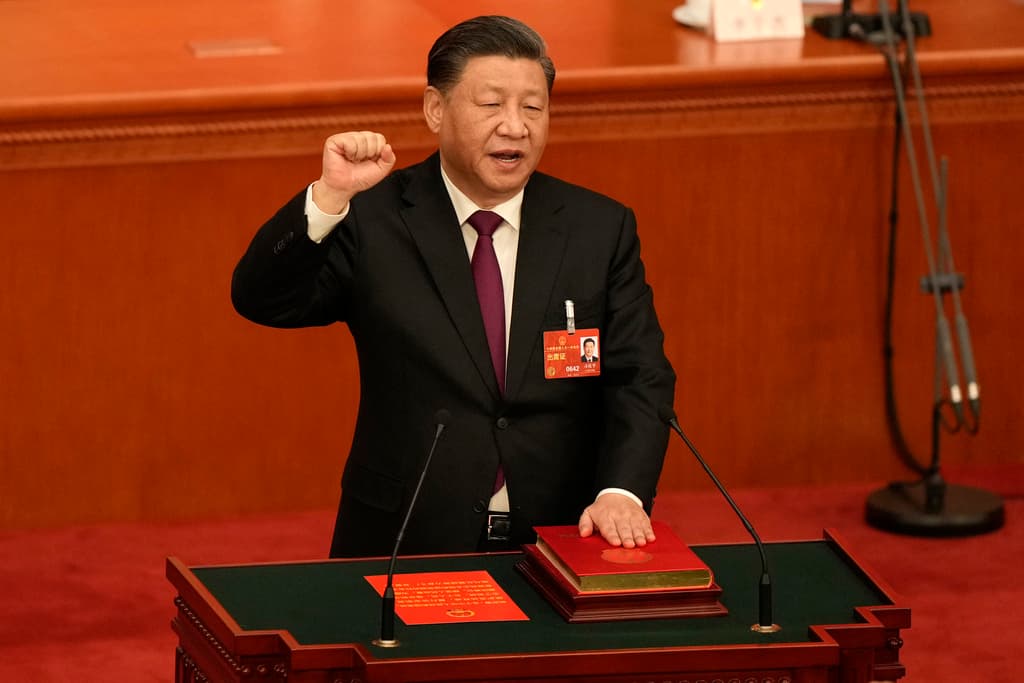The High Cost — $40,000 for a Filet Mignon — of Dining With Xi Jinping
American executives are paying to have dinner with President Xi on Wednesday as he seeks to attract foreign investment to the People’s Republic.

Hor d’oeuvres, champagne, filet mignon, and a seat at President Xi Jinping’s table — that’s what $40,000 will buy American executives at a welcome dinner for Communist Chinese Party officials at San Francisco on Wednesday.
Mr. Xi is inviting American corporate leaders to clink glasses and chew on his pitch to bring business to the People’s Republic, whose economy is stagnating as foreign investors lose confidence in the regime. The price of sitting next to the leader of America’s economic rival, though, might be the endangerment of corporate stability and national security.
“Gullible executives who do fork over the annual wage of the average American to attend this CCP propaganda exercise,” the chairman of the select committee on China, Congressman Mike Gallagher, says in a video on X on Tuesday, “should remember the willingness of the CCP to weaponize market access and supply chain vulnerabilities, along with a penchant for the theft of intellectual property.”
The gathering is part of a two-day “C.E.O. Summit” taking place on the sidelines of a bigger meeting of the leaders of 21 countries organized as the Asia Pacific Economic Cooperation. The dinner and reception, hosted by the National Committee on U.S.-China Relations and the U.S.-China Business Council, costs $2,000 a ticket, and $40,000 for companies to access eight seats at a table plus one seat at Mr. Xi’s table.
The gathering appears to be an attempt to woo corporate America despite Beijing’s increasingly harsh treatment of foreign companies. A survey by the Business Council, a nonprofit organization that seeks to promote trade between the two countries, found that a growing portion of its members — 34 percent — had stopped or reduced planned investment in China over the past year.
The high-level engagements between Communist Chinese officials and American executives at APEC this week include the first face-to-face meeting between President Biden and Mr. Xi in more than a year. These are an attempt “to send a signal that China’s open for business,” the Freeman Chair in China studies at the Center for Strategic and International Studies, Jude Blanchette, said in a briefing last week, and “to send a signal to the global business environment that China is seen as attractive.”
American companies are “flocking” to meet the Chinese president, Mr. Blanchette said. Their eagerness, though, might backfire. “Make sure you check your wallet and your phone on the way out,” Mr. Gallagher warned. “This is particularly true for U.S. companies that work on critical emerging technology, including pharmaceuticals, bio and med tech companies, batteries, AI, advanced computing and chip manufacturing’s companies.”
Last month, officials from the United States, Britain, Canada, Australia, and New Zealand accused China of intellectual property theft and using artificial intelligence for espionage. The “unprecedented” joint call, according to the director of the Federal Bureau of Intelligence, Christopher Wray, underscored the “unprecedented threat” China poses to innovation across the world.
Corporate leaders are the targets of this threat. Communist China is expanding its so-called anti-spying crackdown on American companies operating there, including to the consultancy Bain & Company, the international advisory firm Capvision, and the corporate due diligence firm Mintz Group.
American bankers and executives have also been subject to exit bans issued by Beijing. The U.S. Department of State warns citizens to “reconsider travel” to mainland China in light of its arbitrary enforcement of local laws and the risk of wrongful detentions. “It is easier to enter the PRC than it is to leave,” Mr. Gallagher said, “something as true for capital as for executives detained on fabricated charges.”
The diners also appear to be forgetting Communist China’s ongoing extrajudicial internment of more than a million Uygher Muslims. “Financial institutions,” Mr. Gallagher said, “view the dinner as a chance to sign new deals facilitating the flow of American capital to companies blacklisted by the US government for their support of the CCP’s military buildup and human rights abuses. …”
The cost of fine dining with the leaders of America’s geopolitical adversary might be more than a numerical sum. “The business community needs to remove its golden blindfolds and understand that doing business with the CCP risks the safety of their employees, their shareholders, investors, and the savings of millions of Americans,” Mr. Gallagher asserted. “Forty-thousand dollars may buy you a meal with Xi, but it can’t buy you a conscience.”

